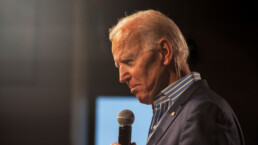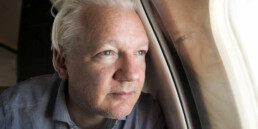Although usually eager to defend Democratic incumbents facing strong primary challenges, this time the party’s leadership offered winks and nods to Bowman’s AIPAC-funded opponent, George Latimer.
By Peter Beinart, The Beinart Notebook
I made a second video this week because I wanted to say something about Jamaal Bowman, who lost his primary race for Congress last night. He lost because he had the courage to visit the West Bank and speak about what he saw. He lost because he’s an unusual politician. He has moral courage.
Jamaal Bowman’s Courage by Peter Beinart
Sources Cited in This Video:
A Politico article about Bowman’s trip to the West Bank.
A Jewish Currents article I wrote about how Pro-Israel groups keep US foreign policy white.
Our guests this Friday at 11 AM will be Raja Khouri and Jeffrey Wilkinson, co-authors of the book, The Wall Between: What Jews and Palestinians Don’t Want to Know About Each Other. Since October 7, dialogue between Palestinians and Jews has become even more difficult, and there are those in both communities—and on the left and right—who question its value. I’m excited to ask Raja and Jeffrey to respond to those criticisms, and to explain how they believe that greater dialogue between Palestinians and Jews can contribute to the struggle for equality, freedom, and safety for everyone.
Paid subscribers will get the link this Tuesday and the video the following week. They’ll also gain access to our library of past Zoom interviews with guests like Rashid Khalidi, Thomas Friedman, Ilhan Omar, Benny Morris, Noam Chomsky, and Bret Stephens.
See you on Friday,
Peter
VIDEO TRANSCRIPT:
So, last night, Jamaal Bowman lost his race for re-election to Congress. And I wanted to say something about him and that race. Now, it’s important not to be willing to overlook the flaws of people just because you profoundly agree with them on really important policy issues. So, I don’t want to suggest that Jamaal Bowman didn’t make any mistakes in this race. I think it was unfortunate when he said that Jews in Westchester segregate themselves. If you look at the context, I think you can understand what he was trying to say, which was essentially that people would understand him better if people live together more, and that would actually break down antisemitism. But still, I think it was probably a territory that he shouldn’t have ventured into. But that said, again, even though we need to be willing to be critical of people we disagree with, it’s also important that we not be naive.
And that comment had nothing to do with the onslaught that Jamaal Bowman faced from AIPAC and other pro-Israel groups. That onslaught was fundamentally about one thing. It was about the fact that Jamaal Bowman was a passionate supporter of Palestinian freedom. When members of Congress are staunch supporters of Israel, they can say things that are far, far more problematic vis-à-vis Jews than anything that Jamaal Bowman ever said, and get a complete pass. The reason that Jamaal Bowman had a target on his back was really simple. It’s because he went to see what life was like for Palestinians in the West Bank. Now, that might not seem like a big deal, but it actually is because the vast majority of members of Congress avert their eyes. They make a conscious choice to go to Israel on AIPAC junkets that don’t show them the reality of what it’s like for Palestinians to live their entire lives without the most basic of human rights. I suspect perhaps they just don’t want to know because they know that if they did see, it would only cause problems for them. But Jamaal Bowman went to see. He even went to Hebron, which is perhaps the most brutal of all the places in the West Bank, a place where Palestinians can’t even walk on certain streets in their own city. And he had the courage to see. And he had the courage to talk about it. And that’s unusual for a member of Congress.
And the thing you always need to remember about these people, you know, who spent untold amounts of money, unprecedented amounts of money, on trying to defeat him—the people who gave all this money to AIPAC and other pro-Israel groups to defeat him—is that, overwhelmingly, they have not seen the things that Jamaal Bowman has seen. I have lived in proximity to those people my entire life. I’m telling you they may have been to Israel 40 times. But those kind of AIPAC donors, they don’t go to see what life is like for Palestinians who have lived their entire lives in the West Bank without the right to vote for the government that has life and death power over their lives under a different legal system, a military legal system, while they’re Jewish neighbors enjoy free movement, and due process, and the right to vote, and citizenship. If they had gone to see those things, I think many of them would not be AIPAC donors because it would shake them to their core. But one of the reasons I think they find the kind of things that Jamaal Bowman says so frightening is because they haven’t had the courage to go and actually face these realities for themselves. But Jamaal Bowman did go to face these realities and then he took it upon himself to talk about what he had seen. And he paid a political price.
The second thing I want to say about Jamaal Bowman and this race is that you can’t disentangle the attack that he came under because of his views about Israel from the opposition to him simply because he was a courageous and passionate progressive on a whole range of issues. The thing that’s important to remember about people who give a lot of money to AIPAC is it’s not just that they’re pro-Israel, or that they’re generally Jewish. They’re also extremely wealthy. And it’s often difficult to disentangle their pro-Israel politics from their class perspectives. But things fuse together, right? They don’t want supporters of Palestinian rights in Congress. But they also don’t want people who are going to raise their taxes or try to fundamentally change the American economic system.
And so, when you defeat Jamaal Bowman, it’s kind of a twofer because you get rid of a critic of Israel, but you also get rid of someone who potentially could threaten your own bottom line. And one of the dirty little secrets, I think, about kind of American Jewish organizational life is that people find it often easier to say that they oppose progressives because those progressives are anti-Israel or supposedly ‘antisemitic’ than to admit that partly they’re doing it for economic self-interest because they’re just really rich people who don’t want progressives like Jamaal Bowman because those people might threaten their bottom line. So, that’s another reason I think that progressives like Jamaal Bowman come under such fierce assault. It’s much nicer if you’re one of the very, very wealthy people who gave all this money to AIPAC to have a kind of milquetoast moderate like George Latimer who won’t rock the boat on Israel. And he won’t really rock the boat by challenging corporate interests on anything.
The third point I want to make about Jamaal Bowman has to do with race. Now, it’s not true that AIPAC opposes Black members of Congress simply because they’re Black. Which is to say if there’s a really, really pro-Israel Black member of congress, like Ritchie Torres, they’re thrilled about that, right. But it’s also not coincidental that so many of the people that AIPAC tries to destroy politically are Black or other people of color. And that’s because people who have a family history of oppression in the United States are more likely—not always, by any means—but, on average, are more likely to identify with the Palestinians because of their own experience. They’re more likely to feel, as Jamaal Bowman did, a kind of moral obligation to themselves and their own ancestors to go and see what’s actually going on to Palestinians who lack basic rights in the West Bank.
And so, when you go to politically destroy people who care about Palestinians, you’re going to end up destroying a disproportionate number of those people who will be Black or other people of color. And there’s a whole history to this. It didn’t start with Jamaal Bowman. You can think about Andrew Young, Jimmy Carter’s Ambassador to the United Nations, who, coming out of the Civil Rights movement, felt he had an obligation to have a concern for Palestinians, and met a PLO representative in the late 1970s, and there was a big pro-Israel outcry, and he was forced out of his job. Or Jesse Jackson, who came under assault in the 1980s when he ran for president, or a congressman like Walter Fauntroy or Barack Obama or Raphael Warnock. You may remember that Raphael Warnock went on a trip of Black pastors to see Palestinian life for himself, wrote a very passionate, eloquent letter talking about the parallels between the oppression of Palestinians and the oppression of Black Americans. And Raphael Warnock came under fierce assault and had to walk that back. And if he hadn’t walked that back, he probably wouldn’t be a senator right now.
Jamaal Bowman is a different kind of person. He’s a very unusual politician in that he is a man of genuine moral conviction, of genuine moral courage, and he was willing to put his political life at risk. And he did so perhaps partly because we are in this extraordinarily horrifying moment—a moment when people are being tested, when people are doing things that I think we will remember for a very long time. I saw yesterday that Save the Children was reporting that, by their estimates, as many as 20,000 children in Gaza are either detained, missing, lying in mass graves, or dead under the rubble. Twenty thousand. I think perhaps Jamaal Bowman knew that this was a moment on which he was willing to be judged and he was willing to risk his political career for that. And I really, really hope that I live long enough to live in an America in which Palestinian lives are considered equal to Jewish lives. And in that America, I believe, that people will look back with shame at what was done to Jamaal Bowman, and maybe even some of those AIPAC donors or their children or grandchildren will feel shame, and we will look back at Jamaal Bowman in this race as a hero.
It says in Pirkei Avot in the Mishnah—and forgive the gendered language, it was written a long time ago—it says, ‘in the place where there is no man, be a man.’ Or we might retranslate it as, ‘in the place where there is no humanity, bring humanity.’ Jamaal Bowman was in a place in Congress in Washington where there are very, very few people who are willing to risk anything politically for the cause of Palestinian lives, for the cause of Palestinian freedom. And he did. In a place where there was no man, he was a man. And for that reason, I believe we will one day look back on him as a hero.
Recent Posts
I’ve Been Saying “Step Aside, Joe” For Two Years — Here’s What I Learned
June 29, 2024
Take Action Now An opinion that was once unthinkable is quickly taking hold of the Democratic Party. What will it take for Joe Biden to step aside?……
How Lobbyists Could Now Install Biden’s Replacement
June 28, 2024
Take Action Now If the president steps down, the DNC committee that could pick the new nominee is stocked with corporate lobbyists looking to…
Assange: I Broke The Law But The Law Is Wrong
June 28, 2024
Take Action Now Julian Assange’s Plea Deal With The United States Was Completed Before A U.S. Federal Judge Wednesday On The U.S. Possession Of The…
SXSW Ends U.S. Army Partnership After Backlash From Artists Over Palestine
June 27, 2024
Take Action Now Festival severs Army and defense contractor sponsorships after more than 80 artists withdrew from 2024 edition By Adrian Horton,…




